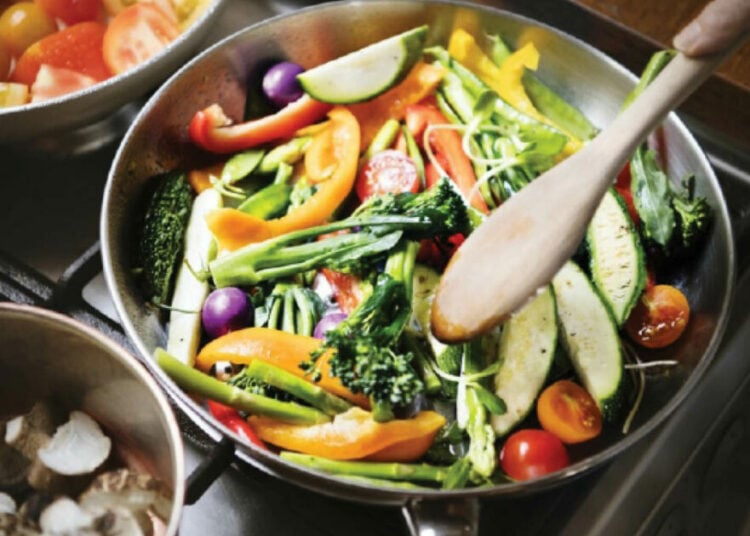Food is more than fuel. It is memory, comfort, and sometimes even medicine. Yet the way we prepare it often matters as much as what we put on our plates.
In many Nigerian homes, cooking is an act of care sizzling oil for akara on a Saturday morning, steaming moi moi leaves for a festive gathering, or grilling suya by the roadside on a breezy night. Each method carries its own story, but it also carries a health consequence we don’t always pause to consider.
Research continues to show that cooking techniques can either preserve nutrients or strip them away. For instance, water-soluble vitamins like vitamin C and folate are easily lost during prolonged boiling, while deep-frying may load meals with unnecessary fat that burdens the heart. On the other hand, methods such as grilling, steaming, and stir-frying often strike the right balance retaining nutrients, enhancing natural flavors, and minimizing the need for excess oil or salt.
Think of it this way: food is already a gift; these cooking methods help us present that gift in its most nourishing form. And because food is also culture, it’s comforting to know that these healthier choices are not foreign they are already part of our Nigerian kitchen story.
Grilling:
Grilling is one of the most celebrated methods across Nigeria, from suya sellers in Kano to whole roasted fish along Lagos beaches. What makes it special is not only the smoky depth of flavor, but also the health benefits: fat drips away during cooking, leaving meat and fish leaner. Unlike frying, you don’t need much oil the fire itself does the work.
Science backs this up: grilling helps proteins retain more iron and zinc while keeping calorie levels lower. However, the key to truly healthy grilling is technique. High heat can sometimes create harmful compounds if fat drips and causes flare-ups or if food is charred.
The secret is to embrace a gentler grill:
Marinate meat and fish with spices, lemon, or herbs to reduce risky compounds.
Trim excess fat to prevent flare-ups.
Flip food frequently to avoid burning any single spot.
Think of grilling as a balance between fire and patience letting food cook through without losing its natural goodness or your peace of mind.
Steaming:
Steaming is often overlooked in Nigerian kitchens, yet it is one of the gentlest ways to prepare food. It uses heat without drowning food in water or oil, which means delicate vitamins remain intact.
Moi moi is a perfect example: beans blended with peppers, onions, and oil, then wrapped in leaves and steamed into tender, nourishing pudding. The result is protein-rich, light, and deeply satisfying.
Studies show that steaming vegetables like ugu, spinach, or broccoli preserves antioxidants better than boiling. Even fish and chicken benefit from this method, becoming tender without losing flavor. If plainness is a concern, infuse your steaming liquid with herbs, citrus, or ginger to create subtle but vibrant notes.
Stir-Frying
Though borrowed from Asian kitchens, stir-frying has found a home in modern Nigerian cooking. Its magic lies in speed high heat for a short time, just enough to sear without overcooking. The result is vegetables that stay crisp and colorful, with more vitamin C preserved than in slow cooking.
Imagine a quick toss of chopped ugu, carrots, shrimp, and a drizzle of soy sauce in a hot pan. Within minutes, you have a dish that’s vibrant, nutrient-dense, and satisfying without being heavy. The secret is restraint: just a splash of a healthy oil, just a pinch of seasoning, allowing the freshness of the food to shine through.
The Truth
There is no single perfect method of cooking, it depends on the meal, the mood, and what your body craves.
Grilling connects us to fire and bold flavors, especially when done mindfully.
Steaming respects the quiet power of nutrients.
Stir-frying celebrates speed and color.
Together, they remind us that healthy eating is not about denying pleasure, but about making small, mindful choices that protect our well-being.
And because food is also joy, let’s end with something you can make at home delicious, simple, and nourishing.
Recipe: Grilled Tilapia with Plantains and Pepper Sauce
Ingredients
2 medium tilapia, cleaned and scaled
2 ripe plantains
1 medium onion, sliced
Marinade:
2 tablespoons suya spice (yaji)
2 cloves garlic, crushed
1 tablespoon groundnut oil
Juice of 1 fresh lemon
Salt to taste
Pepper Sauce:
4 red bell peppers (tatashe)
2 scotch bonnet peppers (atarodo)
1 onion
1 tablespoon palm oil or groundnut oil
Salt to taste
Method
Marinate the fish for at least 30 minutes. The lemon juice and spices create a protective barrier while infusing flavor.
Slice plantains lengthwise and sprinkle lightly with salt.
Grill wisely: ensure your grill is clean. Place the fish and plantains over medium-hot coals, not roaring flames. Turn frequently until cooked through and golden brown, not charred.
For the sauce: blend peppers and onion, sauté in hot oil, and season with salt.
Serve fish and plantains with pepper sauce and onion rings on the side.
Why it’s healthy: This mindful grilling approach reduces excess fat and minimizes harmful compounds. The marinade adds flavor and protection. Plantains provide fiber and potassium, while peppers deliver antioxidants like vitamin C and beta-carotene. For a fuller plate, pair this dish with steamed vegetables or a quick stir-fried side bringing all three cooking methods into one balanced, vibrant me





